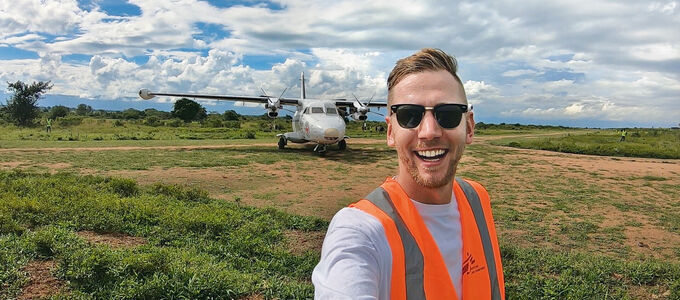Preparing for a humanitarian mission in South Kivu

Sunshine, palm trees, reggae music. The three-minute clip on WhatsApp definitely looks a lot like holiday fun. But Robert is not on holiday. In fact, he is working for Doctors without Borders and helping to build a clinic.
Robert is 27 years old, lives in Hamburg in Germany and works as a project manager for Airbus in aircraft construction. He is a Priest in the congregation of Eimsbüttel and loves paragliding and kite surfing. During the period covered by this article, however, he was unable to do any of these things, because he was working for the international aid organisation Médecins Sans Frontières (MSF/Doctors Without Borders) in the Democratic Republic of the Congo.
What is a project manager doing working for a movement that provides medical aid? “Doctors Without Borders needs people who see to the logistics,” Robert says. “Vaccines have to get from A to B, the cold chain has to be maintained, and you have to make sure that there are enough drivers and guards.”
The idea
Robert had been thinking about volunteering to work in humanitarian aid for a while. What finally clinched it was an accident in March 2019 while paragliding in Denmark. “It was very painful and life-threatening. At the hospital, I was patched up in an emergency operation.”
While he was recovering, he had a lot of time to think. He realised that life can change from one moment to the next and that one should not hesitate to live one’s dream. “I also realised how important emergency medical care is,” Robert explains. “It is not a given that you will be treated in a well-equipped hospital within thirty minutes after an accident.”
The decision
He started to research the requirements under which an assignment with Doctors Without Borders would be possible. Would they even need someone with his skills? “I looked on their website, and by chance there happened to be an info session in Hamburg a week later.”
He applied to the organisation and informed his employer about his plans. Fortunately, his superiors supported him and approved a leave of absence at short notice. For Robert this was a sign that his decision was blessed. “I have felt God’s hand on so many occasions. It was an amazing experience.”
Then came the call from Doctors Without Borders: did he want to help build a hospital in the eastern part of the Democratic Republic of the Congo? He would be responsible for logistics, staff and finance planning. Robert did not even have to consider the question—he was ready.
The hazards
The Democratic Republic of the Congo (DRC) is not a safe country. For example, it is not advisable to travel to South Kivu province, where Robert would be deployed to. There and in many other parts of the country armed conflicts between the Congolese security forces and armed rebel groups are frequent.
Yet, Robert was not afraid to go there. “I myself was surprised how calm I was. I had a lot of trust in the Doctors Without Borders organisation, which has been providing very professional humanitarian and medical emergency aid for decades. When you are interested in such a mission, it is clear to you that you will be sent somewhere where people are in real distress.”
Would Robert be able to attend church while working in the DRC? It did not look like it in advance. Although the New Apostolic Church is very strong in the Democratic Republic of the Congo and there are congregations in many places, he was told that there is no congregation in Baraka, the town in which he would be working. So he prepared himself to stay in touch with the Church mainly through the internet.
And then it was February and Robert landed in Baraka. In the second part of the article tomorrow he talks about how he experienced the rainy season, how his life there was affected by criminals and rebels, and how a personal experience of faith touched him.
Photo: spirit




